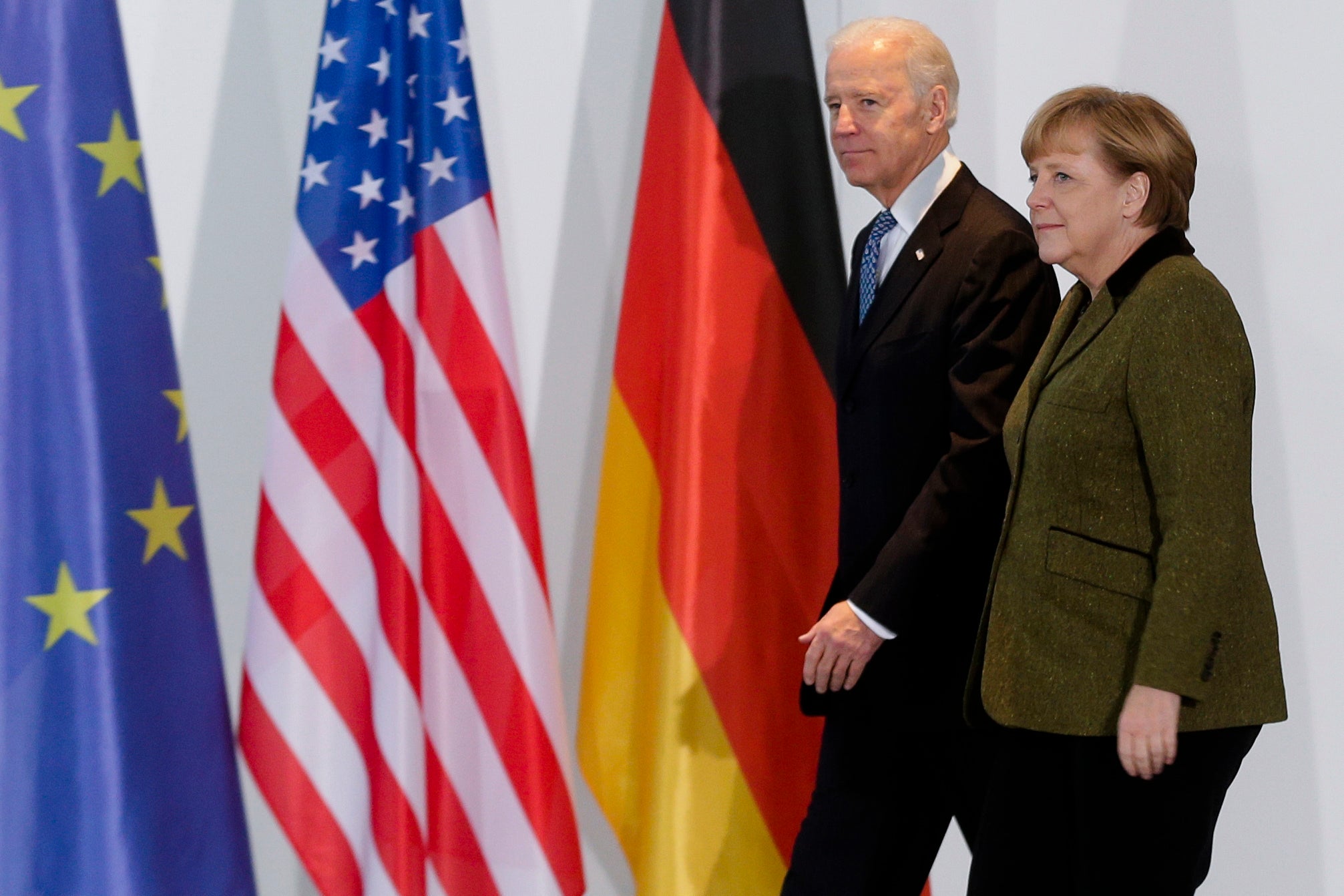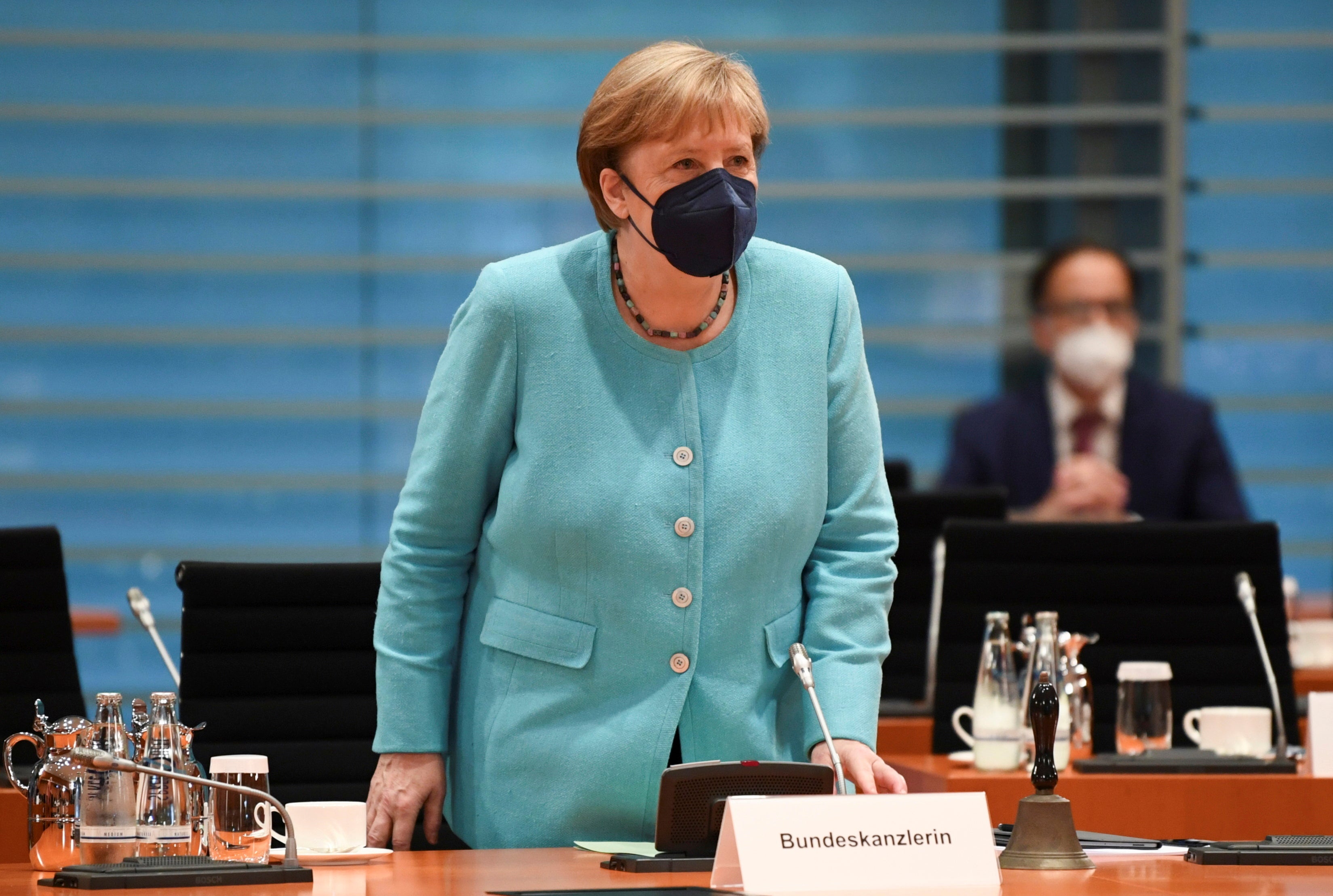Biden and Merkel to focus on Russia, China and cyberattacks in White House talks – but not Nord Stream 2
One item not specifically on the agenda for the world leaders? Russia’s controversial Nord Stream 2 natural gas pipeline

Your support helps us to tell the story
From reproductive rights to climate change to Big Tech, The Independent is on the ground when the story is developing. Whether it's investigating the financials of Elon Musk's pro-Trump PAC or producing our latest documentary, 'The A Word', which shines a light on the American women fighting for reproductive rights, we know how important it is to parse out the facts from the messaging.
At such a critical moment in US history, we need reporters on the ground. Your donation allows us to keep sending journalists to speak to both sides of the story.
The Independent is trusted by Americans across the entire political spectrum. And unlike many other quality news outlets, we choose not to lock Americans out of our reporting and analysis with paywalls. We believe quality journalism should be available to everyone, paid for by those who can afford it.
Your support makes all the difference.Angela Merkel’s Thursday visit to the White House might be her last as Germany’s chancellor, but valedictory ceremonies will be the last thing on the agenda — literally.
Before she sits down to dinner with President Joe Biden and a small group described by a senior administration official as “a range of individuals who have long been strong supporters of Germany and the bilateral relationship,” the 32nd chancellor of Germany and the 46th President of the United States will engage on a full range of policy issues, not least of which is the threat to western democracies posed by a more aggressive China and Russia.
“The leaders … will discuss shared ways to respond to regional challenges, including addressing Russian cyberattacks and territorial aggression, countering China’s rising influence, non-market economic practices and human rights abuses, including forced labor, support for Ukraine’s sovereignty and territorial integrity, and … bolstering the Euro Atlantic aspirations of the Western Balkan countries,” said a senior administration official who briefed reporters on the meeting late Wednesday.
The official added that the president and Ms Merkel will also discuss “their commitment to shoring up democracy at home, and defending human rights, democratic institutions and the rule of law around the world”.

Since the Berlin Wall came down in 1989, Germany and the US have had an extraordinarily close relationship. The US is one of Germany’s largest markets for exports, and Germany is America’s largest European trading partner. And despite many Germans’ post-war reluctance to deploy troops abroad, Bundeswehrsoldiers have fought side-by-side with Americans – the country’s first combat operations since 1945 – as part of Nato’s International Security Assistance Force in Afghanistan.
But even the strong ties between Washington and Berlin became quite strained during the presidency of Donald Trump, who frequently complained that Germany should be paying the US for maintaining a military presence in the country.
But one item not specifically on the agenda for Thursday? Russia’s controversial Nord Stream 2 natural gas pipeline.
Mr Trump frequently complained about the pipeline when airing grievances about the cost of keeping American troops deployed in Germany, and his Republican allies have attacked Mr Biden for allowing Mr Blinken to waive sanctions on the company behind the pipeline as well as its’ chief executive as part of the administration’s attempt to mend ties between the US and Germany.
The official said the waivers have given the US “diplomatic space” to work with German officials to “find ways to address the negative impacts of the pipeline,” but when asked whether Mr Biden and Ms Merkel would discuss the project, the official demurred and noted that the Biden administration has been engaging on the matter “at multiple levels,” including discussions between National Security Adviser Jake Sullivan and Secretary of State Antony Blinken and their German counterparts.
“We are not anticipating any sort of formal announcement or deliverable coming out of the leaders and meetings tomorrow on Nord Stream, but…the teams have been having very productive conversations on this set of issues and we expect that those will continue,” said the official, who added the caveat that Mr Biden would nonetheless “raise his long standing concerns…about Russia’s geopolitical project, and about the importance of developing concrete mechanisms to ensure that energy is not used as a coercive tool against Ukraine, our eastern flank allies, or any other country”.
Ms Merkel’s visit to Washington is part of Mr Biden’s “overarching goal” of “revitalizing the transatlantic relationship” by “increasing cooperation with NATO and raising the level of ambition with the EU,” the official explained, adding that “our relationship with Germany … is a very important foundation for all of that”.
To that end, Mr Biden and Ms Merkel will commemorate Thursday’s meeting by releasing a document that will be known as the “Washington Declaration”, meant to “outline their common vision for cooperation to confront policy challenges.”
“This document is likely to lay out the broad principles and values that are shaping our relationship, and that we believe are going to be guiding principles for the relationship in the months and years ahead as we continue to confront the shared challenges that that we both face in terms of our shared commitment to democratic principles, values and institutions, and human rights, our common dedication to upholding the international rules based order and an open world without spheres of influence, our joint efforts to build strong and equitable market economies that cultivate resilience and demonstrate that democratic leadership delivers for the world,” the official said.
Other “deliverables” expected from the meeting include a “futures forum” to “bring together Germans and Americans from a wide range of sectors, to be able to analyse and propose solutions to global problems going forward,” as well as a “a climate and energy partnership,” which the official said would “enable us to work together to address climate change, transformational energy technologies and support for energy transitions in in emerging economies”.
Join our commenting forum
Join thought-provoking conversations, follow other Independent readers and see their replies
Comments